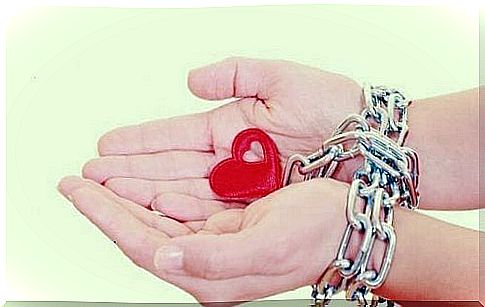Relationship With Ourselves: What Dangers?

We find it hard to believe that there are factors that can damage our relationship with ourselves, even more so that we ourselves feed them. Ultimately, everyone is supposed to want the best for themselves. But the human being is contradictory and often incomprehensible, so sometimes he acts in ways that go against his own well-being.
In our adult life, the most important relationship is that with ourselves. As adults we should have gained so much experience and knowledge that we can act guided by free will. A freedom that we sometimes use consciously and sometimes unconsciously, implementing measures that damage the relationship with ourselves.
The relationship with ourselves as adults
None of us voluntarily develop an inner conflict. Most people want to feel good about themselves. If we are well, we want to be better. The problem is that there are preconscious mechanisms that hinder well-being.
For this reason it is important to recognize the factors that damage the relationship with ourselves. Here are some of them:
1. Psychological dependence
Psychological dependence is one of the factors that damage the relationship with ourselves. It arises from a feeling of underestimation, conscious or not.
We see ourselves as beings in need of help and protection, but bon we realize that this need is fictitious and that it limits – and very much – our independence.
Sometimes this feeling is the result of a rigid upbringing. The person has never seen himself exposed to situations that really put his abilities to the test: the environment in which he grew up was overprotective.

2. Don’t live in the present
Not living in the present is a form of alienation. Today is the moment in which the past and the future are condensed. Everything that is not present exists only in our mind, in the form of memories or prophecy.
Failing to place ourselves in the here and now damages our relationship with ourselves: it is a habit that leads to inactivity. Since the past and the future dwell only in our mind, the tendency is to abandon the action, causing the attention to remain trapped in its own mental dynamics.
3. An extreme sense of duty
We all tend to label a lot more things as obligations than they really are. In many cases, that “must” exists only in our imagination. This is only an option that we have chosen for us, but which in reality does not represent any obligation.
This damages the relationship with ourselves because by becoming more demanding with ourselves, the objectives will become more difficult to achieve. It will be more difficult, for example, to admit that we have done a good job if we feel an obligation to achieve that result in a way that we have not been able to put into practice.

4. Blame ourselves
We take on responsibilities that do not belong to us or we build behavioral models that demand more of us than we can give.
Obviously this is one of the factors that damage the relationship with ourselves, because we end up being the most severe judges of our own actions, and even of our thoughts and desires.
There are many goals that we can achieve; many people we can become. This doesn’t make us bad, it just makes us human. There is no need to blame ourselves for something for no reason. If we make a mistake, just run for cover and move on.
5. Entrust ourselves to fate
Believing in luck, overestimating its influence, makes us more passive. At the same time, it makes us more superstitious and pushes us to put our energies into something that has nothing to do with the flow of events.
That fate plays an important role does not mean living your life according to a plan already written. We cannot choose which card to play, but that does not mean that the cards determine the fate of the game.
6. Having prejudices
Prejudices are pre-established ideas that allow us to work with simple schemes and with few nuances that reduce our cognitive effort, risking to make us fall into error.
These are generalizations, often taken for granted as they come from trusted people, from truly authoritative sources or from a time in our life when we did not have the resources to critically analyze these statements.
These preconceptions influence the relationship with ourselves because they prevent us from being broad-minded and, therefore, to progress. They also feed our totally unfounded fears and impoverish our social network.
7. Obsession with the “right thing”
Justice is a good we all want. The problem is that it is an instance or a dimension in which the solutions are not always immediate.
What is right for some may not be right for others. Not to mention all the times we use the terms “right” and “good” as if they were synonymous, but they are not always.
When the interest in justice turns into an obsession, the risk is to set ourselves up as judges of something we do not know. On the other hand, when faced with a lawsuit it is not always possible to express a superpartes verdict, when two opposing parties are at stake.
All these factors damage the relationship with ourselves and become an obstacle to our well-being. However, it is not difficult to reverse the situation if more constructive perspectives are adopted.









